What happened in the Russia-Ukraine war this week? Catch up with the must-read news and analysis | Ukraine
Every week we wrap up the must-reads from our coverage of the Ukraine war, from news and features to analysis, visual guides and opinion.
Ukraine steps up attacks on Kherson
This week Peter Beaumont reported on the push by Ukraine to isolate the city of Kherson, currently occupied the Russians. On Wednesday, a key bridge into the southern city was hit with a barrage of rocket fire by Ukrainian forces.
Video and witness accounts pointed to up to 18 detonations on the Antonivskiy bridge over the Dnieper River, one of the main Russian resupply routes into Kherson, with Russian anti-missile air defences apparently failing to intercept the strikes. A second railway bridge upstream was also hit.
Ukraine’s armed forces published a one-minute clip on Telegram showing the rocket fire on the bridge just after 1am on Wednesday. “The moment of the flight over the Antonivskiy bridge,” the force said.
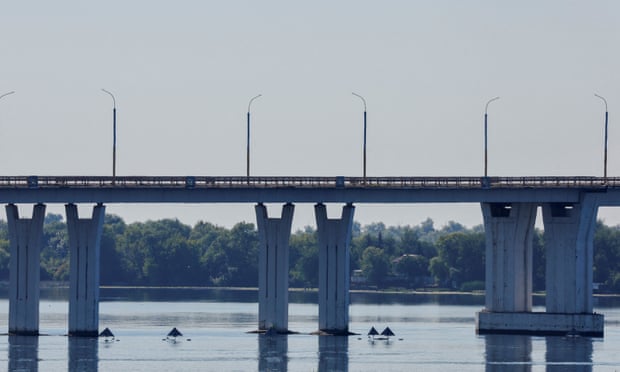
A spokesperson for the Ukrainian military’s southern command, Nataliya Humenyuk, told Ukrainian TV that “surgical strikes” were carried out on the bridge. We are not destroying the infrastructure, we are destroying the enemy’s plans,” she added.
Kherson, captured in early March, has long been a focus for the Ukrainians, with the defenders making limited gains in the countryside between Mykolaiv and the target city since April. But, apparently helped by longer-range weapons with an effective firing distance of up to 50 miles (80km), the Ukrainians are growing more confident.
As the offensive in the south gathered pace, Russia responded by sending a barrage of missiles into Ukraine from Belarus.
Life under fire in Donbas as war enters sixth month
The Russian war against Ukraine has entered its sixth month, and in the eastern Donbas region – home to some of the heaviest fighting – the missiles are still falling. Peter Beaumont travelled to Kostyantynivka, Kramatorsk and Sloviansk, where the sound of shelling and rocket fire was audible in the distance.
“I sleep in my clothes so I can get out quickly if there is an airstrike,” said 85-year-old Tamara, whose home is about 100 metres away from a school that was struck by two rockets on Sunday morning. “The explosion shook my flat … It was like an earthquake. I’m so scared,” she said, close to tears. “I hate it! I hate it! I just want this war to end.”
The cities, all in Donetsk province, are seen as key targets in the attempt by Russian forces to occupy all of the Donbas region, which encompasses Donetsk and neighbouring Luhansk.
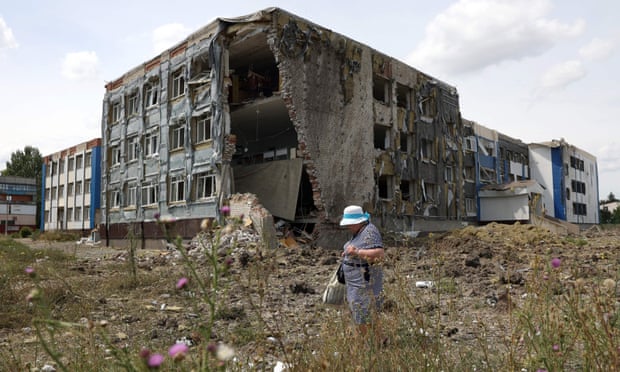
Satellite imaging by Nasa of fires burning along the frontline suggests that Russian artillery shelling has recently diminished. Some analysts suggest that this may be the result of Ukrainian strikes – using newly supplied western artillery systems – on ammunition dumps and command posts, which have degraded Russian capabilities.
But still, residents are not yet willing to believe that it is more than a temporary respite, many see little prospect of an end to the war being in sight.
EU agrees plan to ration gas use over Russia supply fears
The EU has been forced to water down its plan to ration gas this winter in an attempt to avoid an energy crisis generated by further Russian cuts to supply, writes Jennifer Rankin in Brussels.
Energy ministers from the 27 member states, except Hungary, backed a voluntary 15% reduction in gas usage over the winter, a target that could become mandatory if the Kremlin ordered a complete shutdown of gas to Europe.
After days of fraught negotiations, ministers agreed opt-outs for island nations and possible exclusions for countries little connected to the European gas network, which will blunt the overall effect in the event of a full-blown gas crisis.
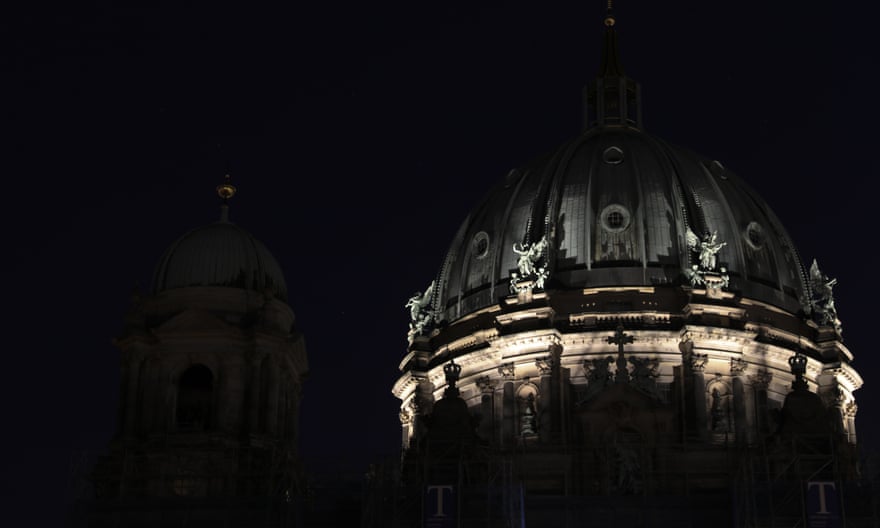
The deal came less than 24 hours after Russia’s state-controlled energy firm, Gazprom, announced a steep reduction in gas supplies through the critical Nord Stream 1 pipeline from Wednesday. The head of the European Commission, Ursula von der Leyen, said there was “no justifiable technical reason” for the cut.
EU governments can choose how to cut gas usage by 15%, as long as they protect supplies to households. Industrial users will feel the pinch first; factories could be given targets to reduce heating and cooling.
In Germany, cities are switching off spotlights on public monuments, turning off fountains, and imposing cold showers on municipal swimming pools and sports halls, as the country races to reduce its energy consumption.
EU gas storage levels are currently at 66%, but by the end of next spring they could be seriously depleted with fewer options to replace stocks. EU officials suggest the gap could be filled by pipeline gas from Norway and Azerbaijan, more tanker-delivered liquified natural gas from as far afield as the US, and efforts to reduce demand.
A day in the life of a Ukrainian city
Once a city of almost 500,000 people, Mykolaiv’s population has almost halved over the past five months. More residents, like Lyubov Verba and her 15-year-old daughter Ksenia, are leaving every day.
Unable to sleep under the Russian shelling that has targeted the city since the beginning of the war in February, Lyubov has developed a tremor.
Her husband, Serhiy, will remain in the city. As will their 12-year-old son Vyacheslav and their daughter Diana, 20, who is married to a Ukrainian soldier. They say they do not want to leave.
“I’m very nervous about the situation,” Serhiy told Peter Beaumont after his wife’s bus has departed for Odesa, a two hour drive away along the coast. “But for her, it was much worse.”
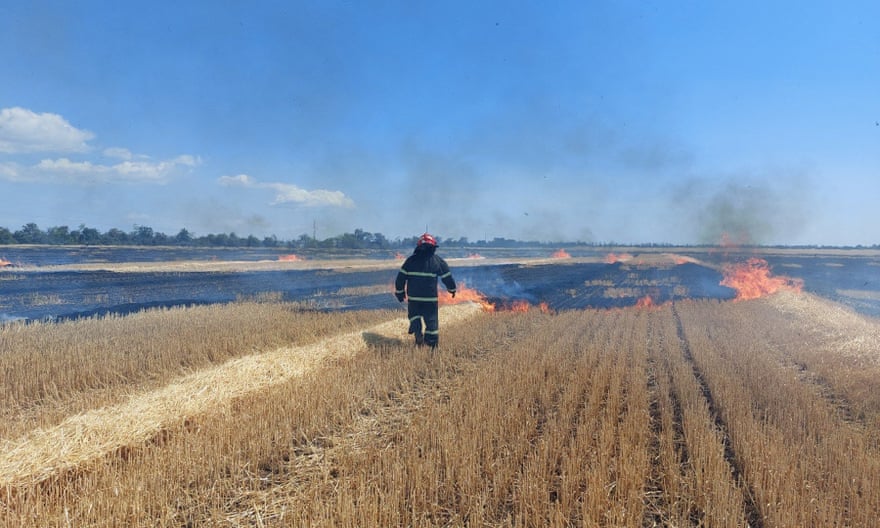
That morning, just after 3am, a missile had struck a few blocks away, leaving a huge crater in the middle of a car wash and blowing out the windows of the surrounding houses. “Out of 148 days of war,” says mayor Alexander Senkevich, “There have been 21 days when we have not been bombarded.”
Far from the city itself, the main water pipe that supplies Mykolaiv has been damaged by Russian fire. Drinking water comes from tankers that residents must queue for.
Next to the water queue is another for food distribution, which begins are 2pm. Vaneeva Valentyna, 68, and Vasyukova Rymma, 84, arrived at 9am, like two dozen others wanting to be first in the queue.
“Come two o’clock, there will be 200 people here,” says Valentyna.
Lavrov’s African tour another front in struggle between west and Moscow
Sergei Lavrov, the Russian foreign minister, has travelled to Uganda on the latest stop of his tour of Africa, aimed at rallying support on the continent for Russia as the war in Ukraine goes into its sixth month.
Many African leaders have refused to condemn Russia’s invasion of Ukraine and have accused the US and Nato of starting or prolonging the conflict.
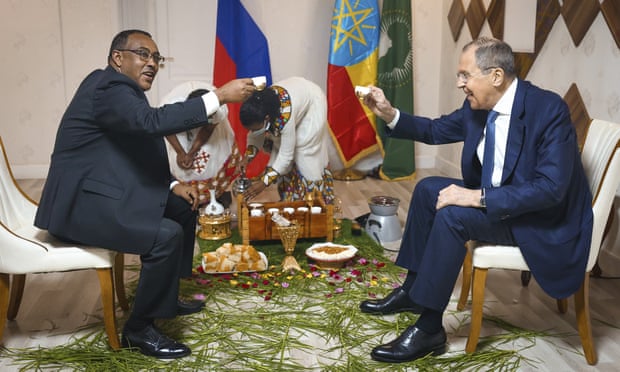
But hundreds of millions on the continent are facing rising food prices and, in some cases, a severe shortage because the blockade of Ukrainian ports by Russia’s Black Sea fleet is trapping tens of millions of tonnes of grain, dramatically exacerbating existing supply chain problems.
As Jason Burke writes in this analysis piece, Lavrov is seeking to convince African leaders and, to a much lesser extent, ordinary people that Moscow cannot be blamed either for the conflict or the food crisis.
Ukraine prepares for remarkable return of league football
Five months ago, footballers in Ukraine could not afford to give a second thought to their sport. The horrors being inflicted by Russia’s invading forces left nobody untouched and the act of staying alive, while ensuring the same of their loved ones, was all that mattered.
But on 23 August, barring a pronounced deterioration in the present security situation, the football season will return in Kyiv, Lviv, Uzhhorod and perhaps Ternopil or Rivne, writes Nick Ames. Games will be played behind closed doors amid a sizeable military presence.
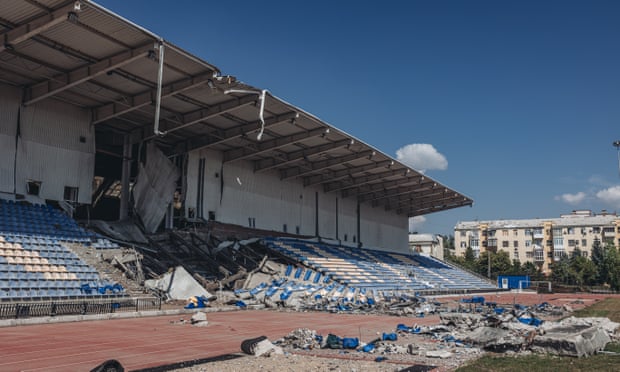
Last Monday representatives from the Ukrainian FA, government ministries and the state emergency service gathered in Kyiv to discuss protocols that, once signed off, should allow the league to commence. “Holding football competitions during the war is not only about sports,” said Andriy Pavelko, the football association president. “It is about demonstrating the fearlessness of our people, the indomitable spirit and desire for inevitable victory. This is a unique initiative in world history: football against war in conditions of war, football for the sake of peace.”
